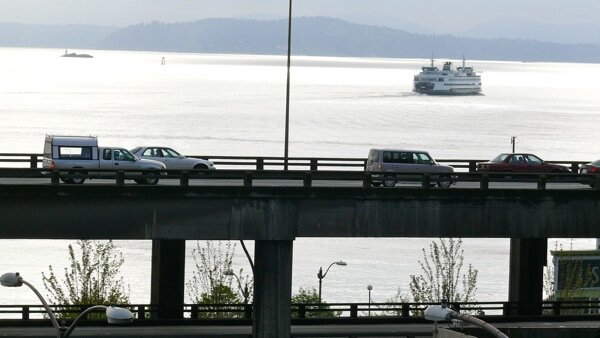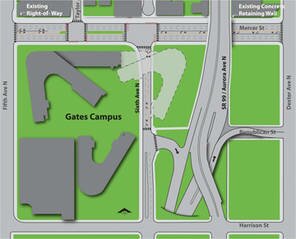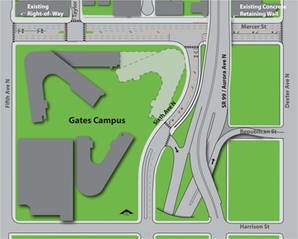A few days ago, the Seattlepi.com's Joel Connelly was scolding Mayor McGinn for his "gratuitous personal insult directed at Gov. Chris Gregoire." At a press conference, McGinn said, "I don't believe we can trust the governor" to protect Seattle against cost overruns from the deep-bore tunnel project. The governor's spokesman Cory Curtis said that Gregoire simply doesn't believe overruns are a threat to Seattle.
That would be news to anyone who's spoken with the state legislature. The latest lawmaker to go on record vowing to make Seattle pay for any excess costs is Rep. Larry Seaquist, a Democrat from Gig Harbor. Seaquist told the Seattlepi.com, "I will be among those who make damn sure that deal stands in place. We bought our own bridge, you can buy your own tunnel" (a reference to funding of the second Tacoma Narrows Bridge).
Gov. Gregoire has mounted lawyerly arguments against the possibility of cost overruns, saying things that sound like there's little possibility of such a thing ever happening, and heaping scorn on McGinn as a foot-dragger. "What could cause a cost overrun? Delay," said the governor, despite the fact that, when it suits WSDOT, a year's extension to the project's timeline is spun as bringing costs down.
Gregoire has also called the specific provision "unenforceable," which may be technically true. But it's also disingenuous. The Legislature is perfectly capable of writing an enforceable provision, and Sen. Jim Kastama (another Democrat) went on record over a year ago to say, if costs exceed the budgeted amount, Seattle will pay. Note that these are both Democrats, and that recent Republican wins have cut into the Democratic majority in both House and Senate....
 The Viaduct will outlive us all.
The Viaduct will outlive us all.
You know that phrase, "money quote"? This time it's literal:
"Both teams, and maybe the two teams that dropped out, expressed concern the [state's cost target] is too low. They couldn't figure out how to bid the project at that amount or lower," Dick Page told the Seattle Times, explaining WSDOT's decision to spend down its $415 million cash reserve by $230 million in concessions to the two bidding teams.
(Page is district leader for HNTB, the engineering part of Seattle Tunnel Partners, which also includes Dragados-USA; the Seattle Tunneling Group is a consortium of S A Healy and FCC Construccion, SA, with design by Parsons Transportation Group and Halcrow.)
Keep in mind that, as TunnelTalk reports, "Specifications within the bid documents are minimal. Much of the means, methods and risk mitigation measures are left to the expertise and preferences of the pre-qualified design-build bidding teams."
Projected tunnel costs have already increased by $60 million, so with this latest news, WSDOT's Cost Estimate Valuation Process has been on the low side by around $300 million on a $2.1 billion project.
Yes, the contingency and risk fund was included in the original estimate, but what we're seeing is that contingency and risk have eaten up half that fund a year before a single clod of earth has been moved. That's not a good sign; what's also not a good sign is that you can't seem to find a single tunnel proponent who is bothered by it.
They should be, because the merits of the project aside, the deep-bore tunnel could see a funding death by a thousand cuts. The state has resolutely capped its contribution to the entire $4.24-billion project at $2.8 billion (leading to a contentious debate over whether Seattle is responsible for any overages). Tolling will be needed to make up part of the funding gap (a tricky prospect, since the higher the tolls are set, the fewer people will use the tunnel).
And the state may have already bitten off more than it can chew. In February, the state's gas tax revenue was down $168 million for the 2009-2011 biennium. The state's Office of Financial Management has updated that number, and the decline has continued. Some $1.8 billion of tunnel funding is supposed to come from gas tax increases passed in 2003 and 2005, but over the entire 16-year forecast horizon for gas tax revenues, the forecast for September 2010 is down almost one percent ($180 million) from the June 2010 forecast. All transportation revenues are off almost $1 billion over that period....
 Council President Richard Conlin
Council President Richard Conlin
Yesterday at 5:38 p.m. I got an email from the City Council announcing that "Seattle City Council President confirms next phase in Alaskan Way Viaduct environmental review,"and that Council President had signed the supplemental draft environmental impact statement (SDEIS) so the city could "remain as co-lead on the [...] project."
The problem with this "git-r-done" mentality is that it doesn't follow the established process and contravenes the city charter. The official signatory for the SDEIS would be Peter Hahn, the chief of Seattle's Department of Transportation. And Hahn reports to Mayor McGinn, who had told him not to sign yet--not the Council. The City Council has no authority in the matter, an upset Mayor McGinn told The Stranger last night.
The City Council's predictably defensive email goes on to explain that the deadline for signing was yesterday, and nothing was happening:
The Director of Seattle Department of Transportation (SDOT) had a scheduled appointment with the state to complete this task. This date has been known to all parties since early July. Yesterday, the Mayor requested more time to review the SDEIS.
It may sound like the deep-bore tunnel SDEIS has been sitting around since July, but as Publicola reports, the city was given just a few days to review it and hand back:...
I apologize for the stress I've put on the pun in the headline, but it's nothing like the stress, apparently, that the Gates Foundation put Seattle's Department of Transportation. Back in May, we were all made aware of the Foundation's discontent with how Sixth Avenue North fed cars to the deep-bore tunnel's north portal.
Currently, Sixth Avenue North does not cross Mercer Street. It bends along Broad Street between Harrison and Republican, and for a full block--Republican to Mercer--it doesn't exist before it snaps back to the grid north of Mercer.
SDOT initially planned to reinvent Sixth as a feeder to the tunnel southbound.
The northwest corner of the Gates Foundation campus being in the way, it would have tunneled underneath at a gradual grade (4.5 percent) and thus allowed cars from Mercer or downtown easy tunnel access.
The Gates Foundation, who are putting a building right there, made noises about millions of dollars in mitigation, and this has resulted in the street grid gaining startling curvilinear properties around the political gravity well that is the Foundation's campus.
A few things happen with the curveball option: the grade increases to six percent, a "half signal" allows Sixth Avenue drivers access to westbound Mercer (but not westbound Mercer to Sixth), and pedestrians have to cross Mercer at Taylor or go up and over via Aurora.
(The full signal in the earlier "from below it onramps" option let westbound Mercer traffic turn left on Sixth Avenue North.)
This is the kind of accommodation from SDOT that most private citizens can only dream of, and it's not likely to make hickorystick at Redstate any more well-disposed to what he calls the tunnel's servicing of "Billionaires' Row." (The tunnel's north portal fetching up around Mercer means its neighbors are the Gates Foundation and Paul Allen's Vulcan developments.)...
The tunnel's southern approach, or, "Acres of Asphalt"
This week, two consultants gave briefings on the deep-bore tunnel planned to replace the Alaskan Way Viaduct: John Newby, P.E., hired by Seattle's City Council, and Dr. Thom L. Neff, hired by Mayor McGinn (video here). Neither man said it would be easy, and neither cared to back up Gov. Gregoire's claim that there will be no cost overruns period.
But apparently it was not within the scope of their inquiry to assess how worthwhile the project is, given the risks. What is the bang for the multi-billion-dollar buck? How does this project's cost/benefit compare with other transportation projects facing the state? Crosscut wants a tunnel vote, but as much as I am dubious about the tunnel project, and despite writing about it for months, I still don't have the information needed for a baseline comparison.
Some very risky projects are worth it. Some aren't. I still maintain that Seattle's decade-long deadlock on the Viaduct's replacement simply indicates that a truly fair, useful, simple solution hasn't been arrived at--largely because leadership insists on "replacing" the Viaduct, rather than better serving the different populations who rely on it. Instead, we're offered a 1.7-mile underground bypass estimated to cost almost $2 billion before anything goes wrong.
"When things go seriously wrong with urban tunnels, the consequences can be significant, leading to long delays, large cost overruns, and extensive 3rd party damages," says Newby's report. Publicola clarifies that--just so there's no confusion--the City Council was informed that there's a 40 percent chance of cost overruns on the $1.96 billion tunnel itself, though the odds incline toward a total of not more than $2.25 billion.
Newby certainly knows firsthand the risks of tunneling; his firm CDM are geotechnical consultants on King County's plagued Brightwater sewage conveyance project. (Here they are discussing in advance how you need to have options besides rescue shafts, given the expense.) "Seattle area glacially consolidated soils have caused significant wear to TBM cutterheads and tools," his report notes. ("Significant" as in "irreparable in situ," in one case that springs to mind. Options? "As of May 1, we have no way to remove it and are still working on a plan," said King County's project manager.)...
The tunnel's southern approach, or, "Acres of Asphalt"
Yesterday City Council President Richard Conlin published an op-ed at Publicola, "State Overrun Language Serves Only to Alarm and Divide Seattleites." Mega dittos! said the Council's Tim Burgess. Apparently the two are unfazed by the prospect of bankruptcy of any kind, including intellectual.
At this point, the two have sailed deep into Glenn Beck territory, in terms of purely opportunistic argument. Forget what Conlin said before--it's different when you really want the shiny new toy.
The groupthink boosterism the two display is probably the most chilling thing to witness, since it's so pernicious to thoughtful assessment in general. When Conlin and Burgess try to characterize the replacement of the Alaskan Way Viaduct as a choice between a deep-bore tunnel or "bicycles," they sink to an embarrassing elementary-school level of disparagement.
Both men's thinking is so riddled with biased "evidence gathering" that it's hard to determine where to start in responding. There's little point in assembling a tedious list of corrections. In the long run, it doesn't matter what either of these men are "for," as regards the project. It's a state route, and the State is driving. It can only matter how well they look after Seattle's interests--and they seem to deaf to a good deal of the clamor around those.
As for "alarm" and "division," there has been no demonstrated majority in favor of a deep-bore tunnel; there is only the failure of the cut-and-cover tunnel option on a public ballot, which is neither here nor there unless you conclude that cost was a decisive factor in that tunnel's rejection. (An astute political leader might steal Mayor McGinn's "obstructionist" wind by reclaiming the fiscal conservative role, but it appears that, deep down, local leadership believe fiscal conservatism and the deep-bore tunnel to be antithetical.)...
Mayor McGinn has handed off a Memorandum of Agreement (between Seattle and the state on the $4.2-billion Alaskan Way Viaduct and Seawall Replacement project) to the City Council. It's probably most remarkable for the fact that neither the Council nor the state seem inclined to read, let alone agree, with its "third way" option. Wrote McGinn in a letter to the Council:
Today I am sending the negotiated agreements between the City and the State, together with some new language for your consideration. This language, which we have included as paragraph 2.11 of the master SDOT agreement, proposes what I call the "third way," and it provides us with a path forward to complete the agreement.
In short, this new contract language would stipulate that Seattle’s agreement to go forward will not take effect unless and until the State amends state law to clarify that the State is responsible for all project funding including cost overruns.
This seems a pro forma move by McGinn. The Council has signaled--mightily--that it has absolutely no problem with the cost overrun provision, and has the numbers to override McGinn's paragraph 2.11. Publicola reports that McGinn didn't bother to discuss his revision with the Council before sending it over.
Council President Richard Conlin, shown laughing and talking with a lobbyist for developers like Vulcan (at an event at Vulcan's Discovery Center), told the Seattle Times an interview over the weekend: "If cost overruns take place, then we'll have to figure it out."
CEO Tay Yoshitani's letter in the Port of Seattle's 2009-10 annual report lays the recession's effects out for you: air travel passengers down 3 percent, shipping container volumes down 7 percent, cruise passengers down 1.2. But the Port also trimmed $16 million from its budget, and has a triple-A rating from Standard & Poor's. Given the extent of the 2009 downturn, you might have expected a lot worse.
By reducing SeaTac's operating costs, the Port was able to reduce what it charges airlines (the cost per emplanement), which gives the airlines the option of charging passengers lower fares, or not going out of business, depending on how things are going. Alaska Airlines and Horizon Air account for 48 percent of the market share at Sea-Tac, with Southwest (9 percent) and United (7) as more distant runners-up. The opening of light rail to the airport gets a tiny sidebar, where it's noted the Port saved $11 million on projected costs.
On the seaport side, to no one's surprise, China remains the top trading partner, with an 8-to1 ratio of import value to export value. That is, Chinese goods worth $16.5 billion arrived, and we sent them just over $2 billion worth. Japan, South Korea, and Taiwan trail at some distance. Singapore and Australia merit the distinction of being net importers. Top five imports are toys and sports equipment, electrical and other machinery, and knit and woven apparel. Top export: the miscellaneous grain, seed, fruit category.
On the cruise side, after adding Carnival to a mix including Holland America, Princess, and Royal Caribbean, Seattle is the sixth cruisiest port in the nation. That said, cruise volume isn't expected to increase: There were 875,000 passengers in 2009, and about 860,000 are estimated for 2010. Still quite a change from 2000, when just 120,000 people set sail....
What is it about being a proponent of the deep-bore tunnel that so often creates the impression that you're still rehabilitating from a nasty stroke? (This is not to say there aren't reasonable tunnel advocates--just that they aren't well-quoted.) This morning's Seattle Times brings an go-go-gadget-tunnel editorial aside that is dumbfounding in its logical discontinuity.
Sadly, the person coming off non-compos mentis, momentarily, is City Council member Sally Clark, who otherwise impresses with her grasp of the issues. Here, she is is defending the Council spending $15,000 on its own lobbyist, rather than rally behind the McGinn administration.
"We don't trust him on the viaduct," said Councilmember Sally Clark. "None of us wants to give the idea (to Olympia) that there is any kind of debate left on this decision."
As Sally Clark surely knows, there is sometimes nothing but debate on the tunnel decision. I suspect that what she means to say is that the Council is no longer debating the decision--which creates a representative gulf between them and the rest of Seattle. (I recall James Surowiecki writing: "The important thing about groupthink is that it works not so much by censoring dissent as by making dissent seem somehow improbable.")
The truly disturbing disconnect, though, is that while the Council is spending extra money on appearing a united front for Seattle--when five minutes with Google provides ample evidence to the contrary--the Legislature itself is divided. As I've written before, there's a profound Olympian schism that means, far from being a "done deal," there is no agreement on how the tunnel will be paid for....
Late yesterday Publicola tweeted that big news was on the way (a Twitter tease, Josh? What are you, the News at 6?), and then unveiled a post titled "Documents Reveal Fix Was In for Deep-Bore Tunnel."
The backstory is that Seattle Citizens Against the Tunnel (SCAT) got their public disclosure request of WSDOT fulfilled, and an enormous amount of really tedious reading became available. It either blows the lid off things or just confirms your suspicions that pro-tunnel interests were driving the WSDOT bus. Publicola's Erica Barnett sums up her findings here:
Emails, internal memos, and other agency documents reveal that WSDOT appointed longtime advocates for the deep-bore tunnel as “experts” on tunnel costs; redistributed tunnel costs to make the price appear lower; and failed to study the surface/transit/I-5 alternative, subbing in a faux four-lane “surface” alternative that included none of the transit and surface-street improvements in the surface/transit/I-5 proposal.
If you are for the construction of the deep-bore tunnel, you will find it hard to get exercised at the sight of WSDOT trying to reduce costs on the project, or enlisting the help of analysts who are likely to help them make their case.
If you are against the tunnel "boondoggle," you may be incensed to find that you aren't supposed to know what the draft environmental impact statement says: "We respectfully request that the public not be given access to this document because FHWA has determined that this preliminary document is an intergovernmental exchange that may be withheld under the Freedom of Information Act."
If you are sick and tired of hearing about the tunnel, you won't have read this post.
From my perspective, the most damaging (if unsurprising) news is that WSDOT didn't bother to compare the tunnel to its most likely competition in the Viaduct replacement sweepstakes: the surface/transit/I-5 plan. It's one thing to paint the best picture of your favorite option; it's another to leave competing options out. If you commute on I-5 daily, you might appreciate an extra lane at the bottleneck.
Seattlepi.com tipped me to news from the Dave Ross Show that at least one state lawmaker, Sen. Jim Kastama (D-Puyallup), doesn't think Seattle will wriggle out of deep-bore tunnel cost overruns.
It's a measure of how worried everyone is about the hot-potato tunnel project that no one wants to admit responsibility for its cost. In the face of a study that shows typical cost overruns at 30 percent or more, Seattle tunnel boosters have been downplaying the possibility that Seattle might be, legally, on the hook.
Rep. Judy Clibborn told Ross today the cost overrun requirement wasn't a legal amendment, according to the state attorney general. "...[T]hat would seem to be trying to trick people into thinking that they're protected when they're not," responded a bemused Ross. "It was a way to get three more votes and to get the tunnel bill passed," explained Clibborn. "[...] We did whatever it took to get it."
Ross spoke next with Sen. Kastama, who said that while he had been unaware that the amendment wasn't legal, it didn't make much difference to him, practically speaking. He assured Ross that the Senate Transportation Committee had already committed all it was going to to the project.
Knowing that transportation funds would be trending lower--along with gas tax revenues--Kastama said they "saw the need to cut significant funds in the transportation budget." But while the state cut almost every other transportation project in the face of our $9 billion deficit, it did not cut the original $2.4 billion allocated for the Viaduct's replacement.
The cost overrun amendment was a response to there being no money to pay for real projects across the state, let alone cost overruns on a single one. (For context, 30 percent of $1.9 billion for the deep-bore tunnel alone is $570 million, or a new total of $2.5 billion.)...
With yesterday's announcement that he won't try to block the deep-bore tunnel, mayoral candidate Mike McGinn managed to buy another news cycle while his adversary Joe Mallahan has been campaigning the old-fashioned way: on credit. It also puts into a new light McGinn's statement at a debate last Saturday that, "I might not win this election, and the tunnel still might not get built."
This morning Publicola interviewed McGinn on the strategic reasons for his shift, and McGinn said, "Yesterday, I acknowledged that it’s not the mayor’s job to ignore legislation passed by the council," referring to the City Council's unanimous vote in favor of the tunnel plan.
The Seattle Weekly is scratching its head over McGinn supporters' equanimity following the news--don't they realize that McGinn is a one-issue candidate who only has support because of his tunnel opposition? Strategic preemption and partisan jeering aside, what this means to voters is that they remain faced with a choice of mayoral skills and...
You haven't read much here about Joe Mallahan, Seattle's other mayoral candidate, and that's because Mallahan has seemingly adopted a "loose lips sink ships" policy to this point. While Mallahan never misses a chance to tout his "progressive values," his demeanor is archetypically conservative. He projects himself as an authority, and bridles at being asked to go into detail. If he says he'll do it, he'll do it.
But the Seattle Times reports that Mallahan is now searching for ways to fund the $191 million dollar Mercer Street redevelopment, after coming out strongly against the project in the primary. The Times quotes Mallahan as saying earlier that the project was "stealing" from Seattle's neighborhoods.
The new Mallahan says things like: "I think the Mercer Street project is a very good neighborhood development project and it will do great things for South Lake Union. If it were properly financed, I would be in favor of it."
Vulcan, South Lake Union's 800-lb. gorilla, would very much like Mallahan to reconsider...





Most Recent Comments